转喻、隐喻机制与英语一词多义现象研究
- 格式:pdf
- 大小:236.93 KB
- 文档页数:3
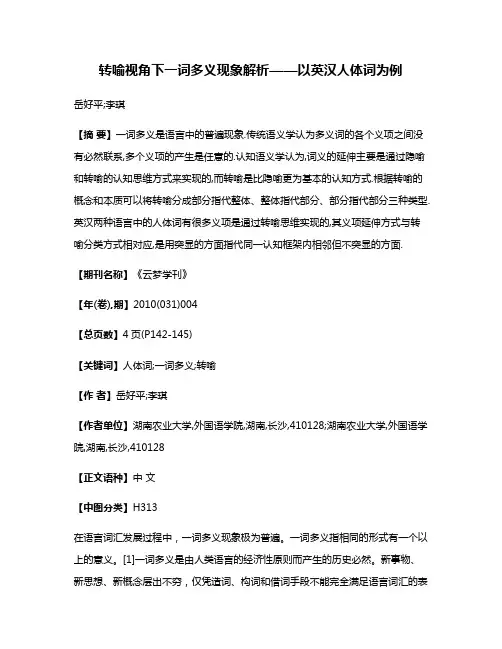
转喻视角下一词多义现象解析——以英汉人体词为例岳好平;李琪【摘要】一词多义是语言中的普遍现象.传统语义学认为多义词的各个义项之间没有必然联系,多个义项的产生是任意的.认知语义学认为,词义的延伸主要是通过隐喻和转喻的认知思维方式来实现的,而转喻是比隐喻更为基本的认知方式.根据转喻的概念和本质可以将转喻分成部分指代整体、整体指代部分、部分指代部分三种类型.英汉两种语言中的人体词有很多义项是通过转喻思维实现的,其义项延伸方式与转喻分类方式相对应,是用突显的方面指代同一认知框架内相邻但不突显的方面.【期刊名称】《云梦学刊》【年(卷),期】2010(031)004【总页数】4页(P142-145)【关键词】人体词;一词多义;转喻【作者】岳好平;李琪【作者单位】湖南农业大学,外国语学院,湖南,长沙,410128;湖南农业大学,外国语学院,湖南,长沙,410128【正文语种】中文【中图分类】H313在语言词汇发展过程中,一词多义现象极为普遍。
一词多义指相同的形式有一个以上的意义。
[1]一词多义是由人类语言的经济性原则而产生的历史必然。
新事物、新思想、新概念层出不穷,仅凭造词、构词和借词手段不能完全满足语言词汇的表意需要,词汇的多义化可以更简便、更有效地解决这一问题。
Lyons指出,“几乎可以肯定现在没有,以往也未曾有过任何一种自然语言,只存在一词一义。
”[2]对同一词汇的多个义项的产生及其相互关系,传统语义学和认知语义学存在很大分歧:传统语义学认为多义词的各个义项之间没有必然联系,多个义项的产生是任意的;认知语义学认为多义词的各种意义之间的关系不是任意的,而是系统的、自然的,各义项之间的关系呈链锁状,A-BC-D等,即后一个义项以前一个义项为基础。
[3]Leech[1]认为词义延伸主要是通过隐喻或转喻的认知思维方式来实现的。
关于隐喻对一词多义现象的解析已有很多文章进行了阐述,本文把笔墨转向一词多义现象的转喻解析,并以英汉人体词汇的多义现象为例予以说明。
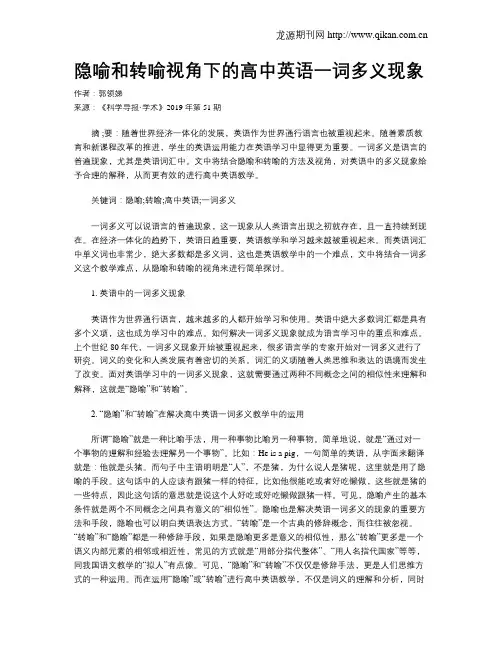
隐喻和转喻视角下的高中英语一词多义现象作者:郭领娣来源:《科学导报·学术》2019年第51期摘 ;要:随着世界经济一体化的发展,英语作为世界通行语言也被重视起来。
随着素质教育和新课程改革的推进,学生的英语运用能力在英语学习中显得更为重要。
一词多义是语言的普遍现象,尤其是英语词汇中。
文中将结合隐喻和转喻的方法及视角,对英语中的多义现象给予合理的解释,从而更有效的进行高中英语教学。
关键词:隐喻;转喻;高中英语;一词多义一词多义可以说语言的普遍现象,这一现象从人类语言出现之初就存在,且一直持续到现在。
在经济一体化的趋势下,英语日趋重要,英语教学和学习越来越被重视起来。
而英语词汇中单义词也非常少,绝大多数都是多义词,这也是英语教学中的一个难点,文中将结合一词多义这个教学难点,从隐喻和转喻的视角来进行简单探讨。
1. 英语中的一词多义现象英语作为世界通行语言,越来越多的人都开始学习和使用。
英语中绝大多数词汇都是具有多个义项,这也成为学习中的难点。
如何解决一词多义现象就成为语言学习中的重点和难点。
上个世纪80年代,一词多义现象开始被重视起来,很多语言学的专家开始对一词多义进行了研究。
词义的变化和人类发展有着密切的关系。
词汇的义项随着人类思维和表达的语境而发生了改变。
面对英语学习中的一词多义现象,这就需要通过两种不同概念之间的相似性来理解和解释,这就是“隐喻”和“转喻”。
2. “隐喻”和“转喻”在解决高中英语一词多义教学中的运用所谓“隐喻”就是一种比喻手法,用一种事物比喻另一种事物。
简单地说,就是“通过对一个事物的理解和经验去理解另一个事物”。
比如:He is a pig,一句简单的英语,从字面来翻译就是:他就是头猪。
而句子中主语明明是“人”,不是猪,为什么说人是猪呢,这里就是用了隐喻的手段。
这句话中的人应该有跟猪一样的特征,比如他很能吃或者好吃懒做,这些就是猪的一些特点,因此这句话的意思就是说这个人好吃或好吃懒做跟猪一样。
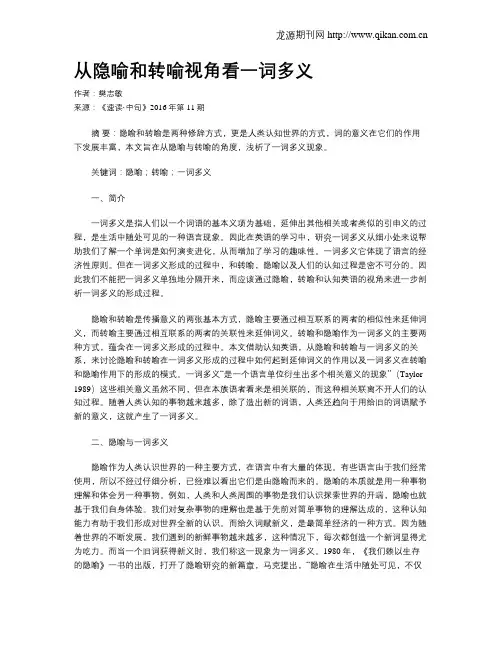
从隐喻和转喻视角看一词多义作者:樊志敏来源:《速读·中旬》2016年第11期摘要:隐喻和转喻是两种修辞方式,更是人类认知世界的方式,词的意义在它们的作用下发展丰富,本文旨在从隐喻与转喻的角度,浅析了一词多义现象。
关键词:隐喻;转喻;一词多义一、简介一词多义是指人们以一个词语的基本义项为基础,延伸出其他相关或者类似的引申义的过程,是生活中随处可见的一种语言现象。
因此在英语的学习中,研究一词多义从细小处来说帮助我们了解一个单词是如何演变进化,从而增加了学习的趣味性。
一词多义它体现了语言的经济性原则。
但在一词多义形成的过程中,和转喻,隐喻以及人们的认知过程是密不可分的。
因此我们不能把一词多义单独地分隔开来,而应该通过隐喻,转喻和认知英语的视角来进一步剖析一词多义的形成过程。
隐喻和转喻是传播意义的两张基本方式,隐喻主要通过相互联系的两者的相似性来延伸词义,而转喻主要通过相互联系的两者的关联性来延伸词义。
转喻和隐喻作为一词多义的主要两种方式,蕴含在一词多义形成的过程中。
本文借助认知英语,从隐喻和转喻与一词多义的关系,来讨论隐喻和转喻在一词多义形成的过程中如何起到延伸词义的作用以及一词多义在转喻和隐喻作用下的形成的模式。
一词多义“是一个语言单位衍生出多个相关意义的现象”(Taylor 1989)这些相关意义虽然不同,但在本族语者看来是相关联的,而这种相关联离不开人们的认知过程。
随着人类认知的事物越来越多,除了造出新的词语,人类还趋向于用给旧的词语赋予新的意义,这就产生了一词多义。
二、隐喻与一词多义隐喻作为人类认识世界的一种主要方式,在语言中有大量的体现。
有些语言由于我们经常使用,所以不经过仔细分析,已经难以看出它们是由隐喻而来的。
隐喻的本质就是用一种事物理解和体会另一种事物。
例如,人类和人类周围的事物是我们认识探索世界的开端,隐喻也就基于我们自身体验。
我们对复杂事物的理解也是基于先前对简单事物的理解达成的,这种认知能力有助于我们形成对世界全新的认识。
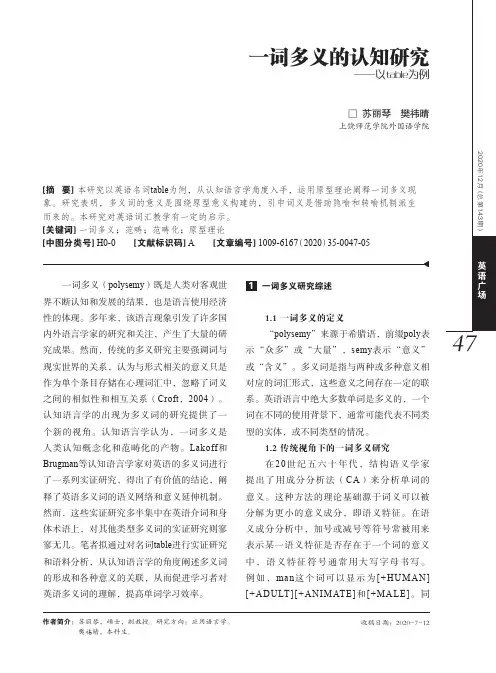
收稿日期:2020-7-12一词多义(polysemy )既是人类对客观世界不断认知和发展的结果,也是语言使用经济性的体现。
多年来,该语言现象引发了许多国内外语言学家的研究和关注,产生了大量的研究成果。
然而,传统的多义研究主要强调词与现实世界的关系,认为与形式相关的意义只是作为单个条目存储在心理词汇中,忽略了词义之间的相似性和相互关系(Croft ,2004)。
认知语言学的出现为多义词的研究提供了一个新的视角。
认知语言学认为,一词多义是人类认知概念化和范畴化的产物。
Lakoff 和Brugman 等认知语言学家对英语的多义词进行了一系列实证研究,得出了有价值的结论,阐释了英语多义词的语义网络和意义延伸机制。
然而,这些实证研究多半集中在英语介词和身体术语上,对其他类型多义词的实证研究则寥寥无几。
笔者拟通过对名词table 进行实证研究和语料分析,从认知语言学的角度阐述多义词的形成和各种意义的关联,从而促进学习者对英语多义词的理解,提高单词学习效率。
1 一词多义研究综述1.1 一词多义的定义“polysemy ”来源于希腊语,前缀poly 表示“众多”或“大量”,semy 表示“意义”或“含义”。
多义词是指与两种或多种意义相对应的词汇形式,这些意义之间存在一定的联系。
英语语言中绝大多数单词是多义的,一个词在不同的使用背景下,通常可能代表不同类型的实体,或不同类型的情况。
1.2 传统视角下的一词多义研究在20世纪五六十年代,结构语义学家提出了用成分分析法(CA )来分析单词的意义。
这种方法的理论基础源于词义可以被分解为更小的意义成分,即语义特征。
在语义成分分析中,加号或减号等符号常被用来表示某一语义特征是否存在于一个词的意义中,语义特征符号通常用大写字母书写。
例如,man 这个词可以显示为[+HUMAN][+ADULT][+ANIMATE]和[+MALE]。
同一词多义的认知研究——以table为例□ 苏丽琴 樊祎晴上饶师范学院外国语学院[摘 要] 本研究以英语名词table 为例,从认知语言学角度入手,运用原型理论阐释一词多义现象。
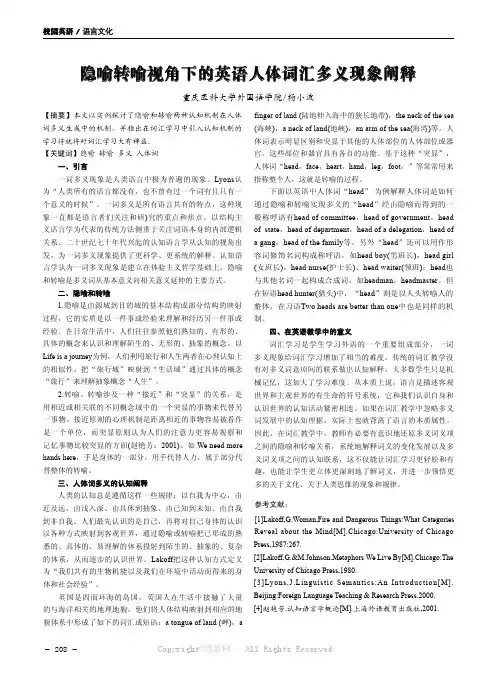
- 208 -校园英语 /语言文化隐喻转喻视角下的英语人体词汇多义现象阐释重庆医科大学外国语学院/杨小波【摘要】本文以实例探讨了隐喻和转喻两种认知机制在人体词多义生成中的机制,并指出在词汇学习中引入认知机制的学习将就将对词汇学习大有裨益。
【关键词】隐喻 转喻 多义 人体词一、引言一词多义现象是人类语言中极为普遍的现象。
Lyons 认为“人类所有的语言都没有,也不曾有过一个词有且只有一个意义的时候”。
一词多义是所有语言共有的特点,这种现象一直都是语言者们关注和研)究的重点和焦点。
以结构主义语言学为代表的传统方法侧重于关注词语本身的内部逻辑关系。
二十世纪七十年代兴起的认知语言学从认知的视角出发,为一词多义现象提供了更科学、更系统的解释。
认知语言学认为一词多义现象是建立在体验主义哲学基础上,隐喻和转喻是多义词从基本意义向相关意义延伸的主要方式。
二、隐喻和转喻1.隐喻是由源域到目的域的基本结构或部分结构的映射过程,它的实质是以一件事或经验来理解和经历另一件事或经验。
在日常生活中,人们往往参照他们熟知的、有形的、具体的概念来认识和理解陌生的、无形的、抽象的概念。
以Life is a journey 为例,人们利用旅行和人生两者在心理认知上的相似性,把“旅行域”映射到“生活域”通过具体的概念“旅行”来理解抽象概念“人生”。
2.转喻。
转喻涉及一种“接近”和“突显”的关系,是用相近或相关联的不同概念域中的一个突显的事物来代替另一事物。
接近原则的心理机制是距离相近的事物容易被看作是一个单位,而突显原则认为人们的注意力更容易观察和记忆事物比较突显的方面(赵艳芳:2001)。
如 We need more hands here ,手是身体的一部分,用手代替人力,属于部分代替整体的转喻。
三、人体词多义的认知阐释人类的认知总是遵循这样一些规律:以自我为中心,由近及远、由浅入深、由具体到抽象、由已知到未知、由自我到非自我。
人们最先认识的是自己,再将对自己身体的认识以各种方式映射到客观世界,通过隐喻或转喻把已形成的熟悉的、具体的、易理解的体系投射到陌生的、抽象的、复杂的体系,从而逐步的认识世界。
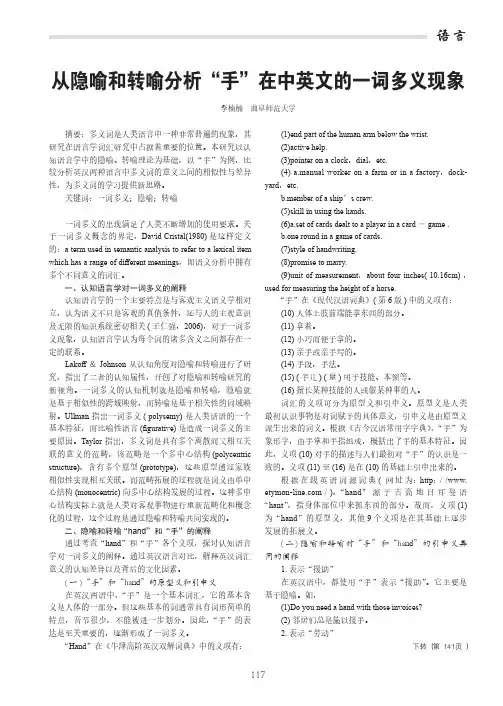
从隐喻和转喻分析“手”在中英文的一词多义现象李楠楠 曲阜师范大学摘要:多义词是人类语言中一种非常普遍的现象,其研究在语言学词汇研究中占据着重要的位置。
本研究以认知语言学中的隐喻、转喻理论为基础,以“手”为例,比较分析英汉两种语言中多义词的意义之间的相似性与差异性,为多义词的学习提供新思路。
关键词:一词多义;隐喻;转喻一词多义的出现满足了人类不断增加的使用要求。
关于一词多义概念的界定,David Cristal(1980)是这样定义的:a term used in semantic analysis to refer to a lexical item which has a range of different meanings,即语义分析中拥有多个不同意义的词汇。
一、认知语言学对一词多义的阐释认知语言学的一个主要特点是与客观主义语义学相对立,认为语义不只是客观的真值条件,还与人的主观意识及无限的知识系统密切相关(王仁强,2006),对于一词多义现象,认知语言学认为每个词的诸多含义之间都存在一定的联系。
Lakoff & Johnson 从认知角度对隐喻和转喻进行了研究,指出了二者的认知属性,开创了对隐喻和转喻研究的新视角。
一词多义的认知机制就是隐喻和转喻,隐喻就是基于相似性的跨域映射,而转喻是基于相关性的同域映射。
Ullman 指出一词多义( polysemy) 是人类话语的一个基本特征,而比喻性语言(figurative)是造成一词多义的主要原因。
Taylor 指出,多义词是具有多个离散而又相互关联的意义的范畴,该范畴是一个多中心结构(polycentric structure),含有多个原型(prototype),这些原型通过家族相似性实现相互关联。
而范畴拓展的过程就是词义由单中心结构(monocentric)向多中心结构发展的过程。
这种多中心结构实际上就是人类对客观事物进行重新范畴化和概念化的过程,这个过程是通过隐喻和转喻共同实现的。
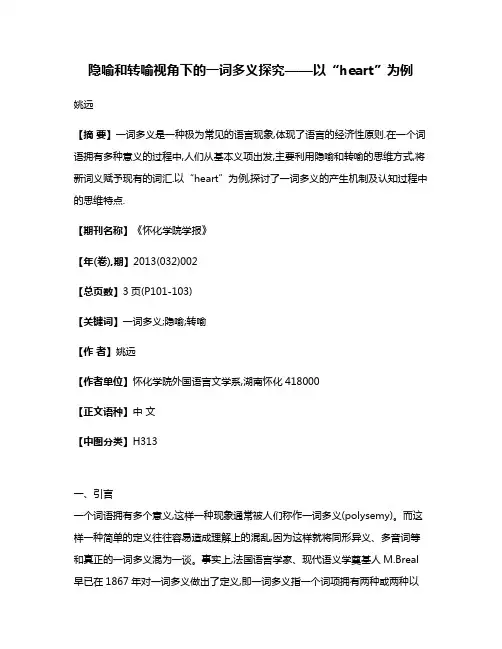
隐喻和转喻视角下的一词多义探究——以“heart”为例姚远【摘要】一词多义是一种极为常见的语言现象,体现了语言的经济性原则.在一个词语拥有多种意义的过程中,人们从基本义项出发,主要利用隐喻和转喻的思维方式,将新词义赋予现有的词汇.以“heart”为例,探讨了一词多义的产生机制及认知过程中的思维特点.【期刊名称】《怀化学院学报》【年(卷),期】2013(032)002【总页数】3页(P101-103)【关键词】一词多义;隐喻;转喻【作者】姚远【作者单位】怀化学院外国语言文学系,湖南怀化418000【正文语种】中文【中图分类】H313一、引言一个词语拥有多个意义,这样一种现象通常被人们称作一词多义(polysemy)。
而这样一种简单的定义往往容易造成理解上的混乱,因为这样就将同形异义、多音词等和真正的一词多义混为一谈。
事实上,法国语言学家、现代语义学奠基人M.Breal 早已在1867年对一词多义做出了定义,即一词多义指一个词项拥有两种或两种以上密切相关的意义的语言现象[1]。
因此,本文在接下来所讨论的例子均是按照此定义筛选出来的。
一词多义现象之所以在任何一种语言中都广泛存在主要是因为它符合语言的经济性原则。
在人类社会的初期,由于各方面都处于萌芽状态,人们所了解和接触的事物都极为有限,因此使用有限的词汇就能满足表达的需要。
然而随着社会的不断发展,人类认知水平的不断提高,一个词语已经不可能仅仅只具备一个意义,人们也不可能不断地创造出新词汇来给新事物命名。
因此一词多义不可避免地成为一种极为常见的语言现象。
对于一词多义现象,国内诸多学者已经从不同角度进行了卓有成效的研究。
林正军、杨忠[2]和张金生、宋成方[3]从索绪尔的语言符号理论出发,探讨了一词多义的生成机制;戴禄华[4]和马明[5]从整体上探讨了一词多义的认知机制;李瑛、文旭[6],则从转喻和隐喻的角度分析了一词多义现象;叶碧慧[7]则专门分析了“head”的转喻认知。
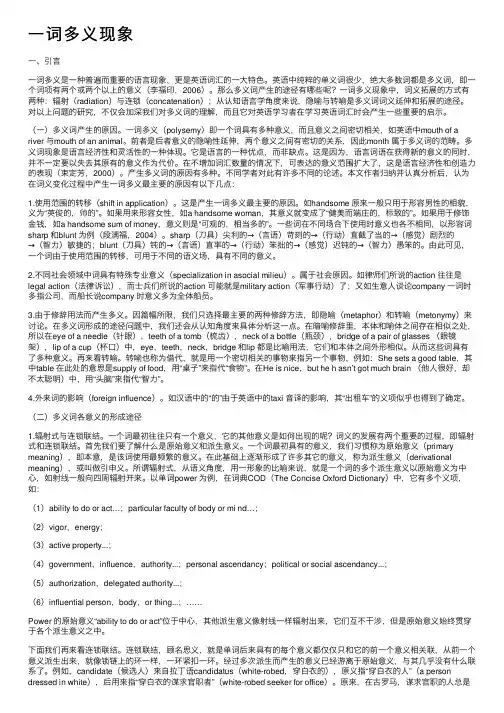
⼀词多义现象⼀、引⾔⼀词多义是⼀种普遍⽽重要的语⾔现象,更是英语词汇的⼀⼤特⾊。
英语中纯粹的单义词很少,绝⼤多数词都是多义词,即⼀个词项有两个或两个以上的意义(李福印,2006)。
那么多义词产⽣的途径有哪些呢?⼀词多义现象中,词义拓展的⽅式有两种:辐射(radiation)与连锁(concatenation);从认知语⾔学⾓度来说,隐喻与转喻是多义词词义延伸和拓展的途径。
对以上问题的研究,不仅会加深我们对多义词的理解,⽽且它对英语学习者在学习英语词汇时会产⽣⼀些重要的启⽰。
(⼀)多义词产⽣的原因。
⼀词多义(polysemy)即⼀个词具有多种意义,⽽且意义之间密切相关,如英语中mouth of a river 与mouth of an animal。
前者是后者意义的隐喻性延伸,两个意义之间有密切的关系,因此month 属于多义词的范畴。
多义词现象是语⾔经济性和灵活性的⼀种体现。
它是语⾔的⼀种优点,⽽⾮缺点。
这是因为,语⾔词语在获得新的意义的同时,并不⼀定要以失去其原有的意义作为代价。
在不增加词汇数量的情况下,可表达的意义范围扩⼤了,这是语⾔经济性和创造⼒的表现(束定芳,2000)。
产⽣多义词的原因有多种。
不同学者对此有许多不同的论述。
本⽂作者归纳并认真分析后,认为在词义变化过程中产⽣⼀词多义最主要的原因有以下⼏点:1.使⽤范围的转移(shift in application)。
这是产⽣⼀词多义最主要的原因。
如handsome 原来⼀般只⽤于形容男性的相貌,义为“英俊的,帅的”。
如果⽤来形容⼥性,如a handsome woman,其意义就变成了“健美⽽端庄的,标致的”。
如果⽤于修饰⾦钱,如a handsome sum of money,意义则是“可观的,相当多的”。
⼀些词在不同场合下使⽤时意义也各不相同,以形容词sharp 和blunt 为例(段满福,2004)。
sharp(⼑具)尖利的→(⾔语)苛刻的→(⾏动)直截了当的→(感觉)剧烈的→(智⼒)敏捷的;blunt(⼑具)钝的→(⾔语)直率的→(⾏动)笨拙的→(感觉)迟钝的→(智⼒)愚笨的。
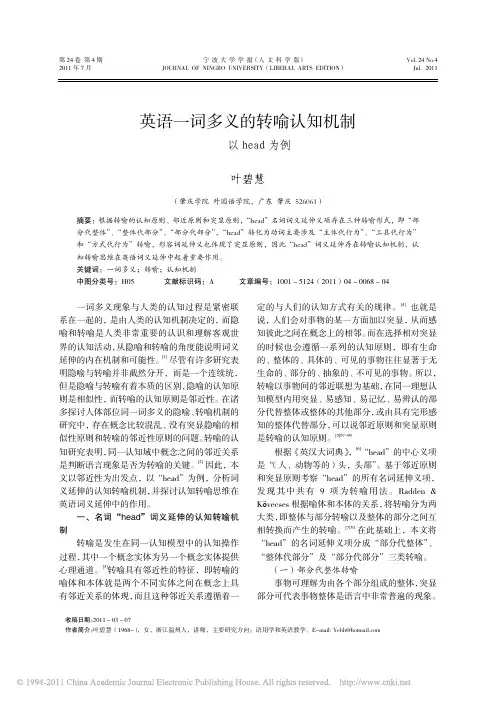
第24卷 第4期 宁 波 大 学 学 报(人 文 科 学 版)Vol. 24 No.4 2011年7月JOURNAL OF NINGBO UNIVERSITY(LIBERAL ARTS EDITION) Jul. 2011——————————————收稿日期:2011 - 03 - 07作者简介:叶碧慧(1968-),女,浙江温州人,讲师,主要研究方向:语用学和英语教学。
E-mail: Yebh@英语一词多义的转喻认知机制——以head 为例叶碧慧(肇庆学院 外国语学院,广东 肇庆 526061)摘要:根据转喻的认知原则、邻近原则和突显原则,“head”名词词义延伸义项存在三种转喻形式,即“部分代整体”、“整体代部分”、“部分代部分”,“head”转化为动词主要涉及“主体代行为”、“工具代行为”和“方式代行为”转喻,形容词延伸义也体现了突显原则,因此“head”词义延伸存在转喻认知机制,认知转喻思维在英语词义延伸中起着重要作用。
关键词:一词多义;转喻;认知机制 中图分类号:H05文献标识码:A文章编号:1001 - 5124(2011)04 - 0068 - 04一词多义现象与人类的认知过程是紧密联系在一起的,是由人类的认知机制决定的,而隐喻和转喻是人类非常重要的认识和理解客观世界的认知活动,从隐喻和转喻的角度能说明词义延伸的内在机制和可能性。
[1]尽管有许多研究表明隐喻与转喻并非截然分开,而是一个连续统,但是隐喻与转喻有着本质的区别,隐喻的认知原则是相似性,而转喻的认知原则是邻近性。
在诸多探讨人体部位词一词多义的隐喻、转喻机制的研究中,存在概念比较混乱、没有突显隐喻的相似性原则和转喻的邻近性原则的问题。
转喻的认知研究表明,同一认知域中概念之间的邻近关系是判断语言现象是否为转喻的关键。
[2]因此,本文以邻近性为出发点,以“head”为例,分析词义延伸的认知转喻机制,并探讨认知转喻思维在英语词义延伸中的作用。
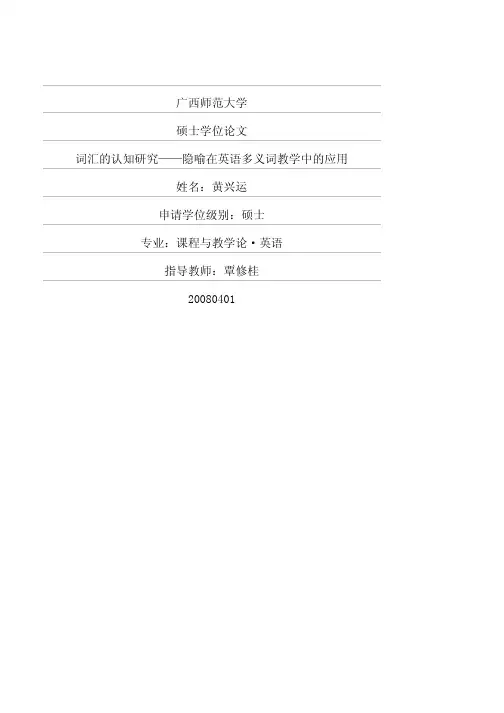
广西师范大学硕士学位论文词汇的认知研究——隐喻在英语多义词教学中的应用姓名:黄兴运申请学位级别:硕士专业:课程与教学论·英语指导教师:覃修桂20080401词汇的认知研究——隐喻在英语多义词教学中的应用研究生:黄兴运年级:2005级学科专业:课程与教学论指导老师:覃修桂教授研究方向:英语教学论中文摘要词汇教学是外语教学的重要组成部分,而一词多义则是词汇教学的难点。
长期以来广大师生都被这一难点困扰着。
这一问题如不能很好地解决,外语教学的质量势必会受到影响。
认知语言学家认为:隐喻是语义产生的主要理据,英语中绝大部分的一词多义都是由于人的隐喻思维引起的;在词义的扩展过程中,隐喻机制起着极为重要的作用。
从这一角度看,如果我们能把隐喻理论运用到英语词汇的教与学中来,那么困扰广大师生的一词多义问题将在一定程度上得到解决。
将隐喻研究与语言教学相结合,这是一个全新的尝试,它始于西方学者林恩・卡梅伦和格雷厄姆・洛。
在2002年的首届全国认知语言学研讨会上,我国学者林书武先生把隐喻研究与语言教学的关系列为隐喻研究的七个主题之一。
由此,隐喻与词汇教学的研究在中国逐渐得到广大语言教育者的关注。
将隐喻理论应用到外语教学中来是外语教学的需要,也是隐喻研究发展的一个趋势。
近几年在各类期刊上发表关于“隐喻与外语教学”这一主题的论文多达30多篇,主要集中在以下四个方面:1)英语教学中隐喻能力的培养;2)隐喻意识在英语教学中的应用;3)隐喻与文化教学;4)隐喻与词汇教学。
其中涉及“隐喻与词汇教学”的硕士论文就有7篇,这些文章都是从宏观上探讨隐喻与词汇教学的关系,他们都没有就词汇教学的具体问题进行专题研究,对于隐喻与一词多义关系还少有人涉及。
一词多义是词汇教学的难点,而这一难点与隐喻密切相关。
如果我们能将隐喻理论应用到词汇教学中来,那么这一难点问题也就可以解决了。
基于这一思想,作者设计本研究,旨在探讨隐喻在英语多义词教学中应用的可行性。
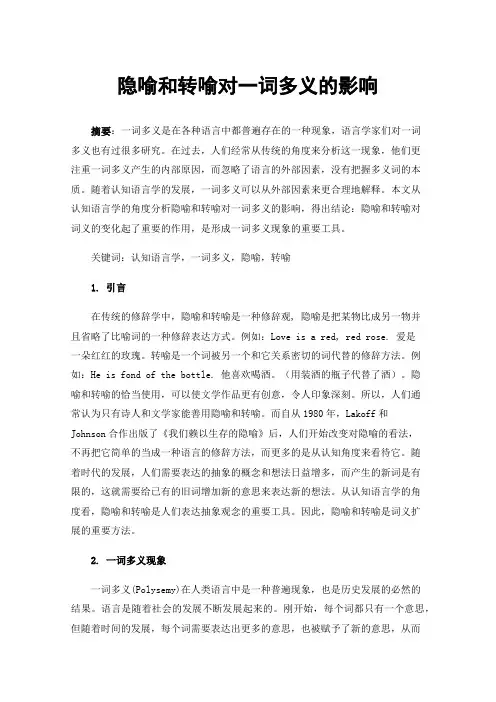
隐喻和转喻对一词多义的影响摘要:一词多义是在各种语言中都普遍存在的一种现象,语言学家们对一词多义也有过很多研究。
在过去,人们经常从传统的角度来分析这一现象,他们更注重一词多义产生的内部原因,而忽略了语言的外部因素,没有把握多义词的本质。
随着认知语言学的发展,一词多义可以从外部因素来更合理地解释。
本文从认知语言学的角度分析隐喻和转喻对一词多义的影响,得出结论:隐喻和转喻对词义的变化起了重要的作用,是形成一词多义现象的重要工具。
关键词:认知语言学,一词多义,隐喻,转喻1.引言在传统的修辞学中,隐喻和转喻是一种修辞观, 隐喻是把某物比成另一物并且省略了比喻词的一种修辞表达方式。
例如:Love is a red, red rose. 爱是一朵红红的玫瑰。
转喻是一个词被另一个和它关系密切的词代替的修辞方法。
例如:He is fond of the bottle. 他喜欢喝酒。
(用装酒的瓶子代替了酒)。
隐喻和转喻的恰当使用,可以使文学作品更有创意,令人印象深刻。
所以,人们通常认为只有诗人和文学家能善用隐喻和转喻。
而自从1980年,Lakoff和Johnson合作出版了《我们赖以生存的隐喻》后,人们开始改变对隐喻的看法,不再把它简单的当成一种语言的修辞方法,而更多的是从认知角度来看待它。
随着时代的发展,人们需要表达的抽象的概念和想法日益增多,而产生的新词是有限的,这就需要给已有的旧词增加新的意思来表达新的想法。
从认知语言学的角度看,隐喻和转喻是人们表达抽象观念的重要工具。
因此,隐喻和转喻是词义扩展的重要方法。
2.一词多义现象一词多义(Polysemy)在人类语言中是一种普遍现象,也是历史发展的必然的结果。
语言是随着社会的发展不断发展起来的。
刚开始,每个词都只有一个意思,但随着时间的发展,每个词需要表达出更多的意思,也被赋予了新的意思,从而导致了一词多义现象。
一词多义是指一个词有两个或两个以上相互关联的含义。
词义可以分为原义和引申义。
基于原型范畴和隐喻转喻认知的大学英语多义词教学的研究获奖科研报告摘要:多义词一直是词汇学习的难点,本文对多义词现象的形成原因及扩展手段进行了介绍分析,通过原型范畴理论论证了多义词的各义项不是毫无联系的,而是具有家族相似性的。
其中一个义项为词语的核心义项,通过核心义项的辐射和连锁衍生边缘义项。
同时多义化的过程是通过隐喻和转喻的认知手段完成的。
通过对原型范畴理论和隐喻转喻认知手段的分析,得出了该认知方式对大学英语教学的启示,即掌握词语的核心意义;培养学生的隐喻思维能力。
关键词:原型范畴理论隐喻转喻多义词教学词汇在语言学习中占有举足轻重的地位,是英语教学的重要内容。
意义作为词汇信息中可变性最大的元素,是词汇的重点也是难点,而多义词更是其重中之重、难中之难。
很多英语学习者会经常遇到一句话每个单词都认识可就是无法理解整句子意思的问题,这是因为传统的英语教学很少将各个义项联系起来,甚至认为很多义项之间没有关联,教师总是把关于某个多义词的各个义项采用例句形式一次性介绍给学生,这些义项没有主次之分,学生只能通过死记硬背方式记忆。
人类的记忆力毕竟是有限的,从而导致教学效果不理想,学习效率较低。
本文试着从认知语言学的角度解释一词多义现象的成因,指出一词多义的各个义项之间并不是毫无联系的、任意的,而是有主次之分的。
词义的延伸主要是在主义项的基础上通过隐喻和转喻的认知机制来实现的。
通过解释各义项的关系并形成语义义项图,可以为英语词汇教学中多义词的教学提供新思路,从而提高教学效率。
1. 多义词的形成——原型范畴理论1.1 原型范畴理论原型范畴理论由 20 世纪 70 年代中期美国心理学家 Eleanor Rosch提出,哲学根源基于 Wittgenstein的“家族相似性”研究。
Wittgenstein论述了中心成员与边缘成员的区别及隶属度,将范畴比作家族,范畴中的成员彼此之间只是相似,而不是相同或者一致,所有的成员都由一个相互交叉的相似性网络联结到一起。
英语多义现象的认知研究【摘要】一词多义是一种普遍现象,指一个词语有多种不同却具有互相联系的意义。
多义不仅是一种语言现象,也是一种认知现象。
本文运用认知语言学的概念隐喻理论论证了多义现象的形成是人类通过认知手段由一个词的中心意义或基本意义向其他意义延伸的过程,是人类认知范畴和概念化的结果。
通过认知语言学理论对多义结构的分析和解释,希望能对英语词汇教学有所启发。
【关键词】一词多义;认知;概念隐喻;词汇教学0 引言一个单词原有的词义与其历时衍生出的词义在某个共时意义上的共存形成了一词多义现象(polysemy),这是人类语言中最普遍的语义现象,它是语言经济性原则和认知经济性原则的客观要求。
一个多义词的各种意义构成一个意义范畴,它们以各种方式发生联系;多义词各义项的产生因不同民族、不同语言而异,在多义词的各个义项中可能有两个或多个具有民族文化的特点。
隐喻是一词多义现象产生的巨大根源。
本文运用认知语言学的概念隐喻理论对多义词的成因进行探讨,希望对英语词汇教学有一定的启发作用。
1 概念隐喻理论对词义发展和变化的原因,传统的语义学理论更多地将它归于历史的、社会的因素,未能充分地解释一词多义现象形成的缘由,没有把握多义现象的全部和本质。
因此,我们就需要一种新的语义理论来对词义变化和一词多义作出合理的解释。
在多义词从中心意义或基本意义向其他意义延伸或拓展的过程中,这些互相关联的意义的延伸和拓展主要依靠两种途径:隐喻和转喻。
Lakoff [1]提出了概念隐喻的理论,运用源域(source domain)与目标域(target domain)之间的隐射(mapping)以及意象图式(image schemas)来解释隐喻现象。
他认为隐喻是从一个比较熟悉、易于理解的源域映射到一个不太熟悉、较难理解的目标域,其心理基础是抽象的意象图式。
隐喻和转喻是一种强有力的认知工具,使人们可以对抽象范畴进行概念化。
隐喻无处不在,在本质上是认知的,语言中存在大量隐喻存在的相似性,成为我们认识事物的范畴的基础。
商务英语一词多义现象的研究作者:冯旭华刘禹晴来源:《校园英语·月末》2018年第09期【摘要】本文以英语国家语料库(BNC)的商务文本(BEC)为研究对象,利用Antconc,分析了cover作为名词时,在商务英语中的一词多义现象及其原因。
研究发现,在BEC语料库中,cover作为名词时共有三种词义。
Cover一词的延伸意义可以通过转喻和隐喻机制实现。
【关键词】一词多义;转喻;隐喻【作者简介】冯旭华,刘禹晴,大连海事大学外国语学院。
一、引言词语的多义性一般指一个词语形式关联两个或两个以上相互联系的词义(Taylor, 1989:103)。
多义词研究涉及哲学、语言学、心理学等领域,也涉及翻译、词典学等语义学的实际运用领域。
商务英语作为专门用途英语的一个分支,许多词语在商务文本中存在着一词多义现象,掌握商务文本中词语的不同含义,有助于理解商务语篇。
本文以相关多义词研究为基础,探讨商务英语中cover的一词多义现象。
二、理论依据一个多义词就是一个范畴,其中有中心意义和边缘意义之分。
中心意义就是词语的核心含义,边缘意义是核心意义的词义延伸,这种词义的延伸是呈辐射状的,即以一词为中心向外扩散。
关于多义词产生的原因,不同学者有不同的阐述。
在Lakoff 和Johnson(1999: 89)看来,转喻常被用来解释人类生活中一些基本的概念隐喻。
Lakoff (1987:287)则用辐射范畴来描述词义的隐喻性延伸。
作为人类主要认知方式,隐喻和转喻常以多种方式相互关联。
首先,他们均是由本体、喻体和喻底三个方面构成。
其次转喻和隐喻常被用作组织人类的行事和思维的方式(朱建新,左光明 2012)。
但隐喻与转喻之间也存在差别。
区别主要表现在:第一,“域”的不同。
转喻的本体和喻体之间的映射是在同一个域中进行,本体和喻体是一种替代关系;隐喻的本体和喻体却是从一个域向另一个域的映射,两者属于不同的范畴。
第二,转喻的投射一般是双向的,隐喻的投射一般都是单向的(李瑛,文旭,2006)。
Vol.9No.122012年12月第9卷第12期Journal of Hubei University of Economics(Humanities and Social Sciences)湖北经济学院学报(人文社会科学版)Dec.20121.引语一词多义(polysemy )是指相同的形式有一个以上的意义。
该术语产生于19世纪60年代,由语义学创始人布雷尔提出。
多义词是在认知的基础上产生的。
当人们碰到新事物、新观念或新经验时,会不自觉地运用语言经济性原则,从已有的词汇中借用描述同样形状或同样功能的词汇来做临时替代。
如果这种替代得到了其他语言使用者的认可,那么这一用法就成为该词汇的一个新的义项。
一词多义现象随之产生。
一词多义现象存在于任何语言中,正像Lyons (1995:72)所说:“没有,也从来没有一种语言中每个单词有且仅有一个意思。
”Britton (1978:7)统计后得出这样的结论:在随意挑选的英语单词中,超过44%的单词有不止一个意思。
2.传统语义学理论对一词多义解释的不足一词多义是英语中普遍存在又重要的语言现象,一直以来都是语言学家关注的焦点之一。
例如,被后人称为现代语言学之父,结构主义鼻祖的F .De.Saussure 认为语言是一种符号系统,符号由“能指”(Signifiant )和“所指”(Signifier )两部分组成。
他认为二者之间是任意的,无法论证的。
Saussure 注意到词形与其本义之间的任意组件,但未能为词以不同但又紧密相关的多义词的意义提供一个清楚和令人信服的解释。
英国语言学家、语义学奠基人之一Stephen Ullmann 从意义变化的角度来考察隐喻。
他把隐喻看作是语言词汇意义变化的一种重要方式并从心理学角度,用相似性联想的理论来解释隐喻产生的基础。
语义成分分析法是结构语言学家提出的一种语义分析方法,他们认为一个单词的意义是由更小的意义要素组成的。
成分分析法能够清晰地揭示语言要素之间的关系。
第28卷第2期湖北广播电视大学学报V ol.28, No.2 2008年2月 Journal of HuBei TV University February. 2008, 121~122 隐喻、转喻机制下的英语一词多义现象吉兆荣(南京航空航天大学 外国语学院,江苏 南京 210016)[内容提要] 一词多义是一种重要的语言现象,主要通过隐喻和转喻来实现。
隐喻和转喻不仅是修辞手段,而且是两种重要的词义延伸的方式。
隐喻以事物间的相似性为基础由源域向目的域映射,转喻以相邻性和突显性为基础在同一个域内实现事物间的映射。
隐喻和转喻并不是截然对立的。
[关键词] 隐喻;转喻;一词多义;认知;映射[中图分类号] H31 [文献标识码] A [文章编号] 1008-7427(2008)02-0121-02一、引言一词多义即一个词具有多种意义,这些词义可以分为本义和扩展义,本义指词汇的原义,是人们最初认识事物时所给予的意义,引申义指从本义引申出来的意义。
一词多义是一种普遍的语言现象,不同语言学派对一词多义的描述也各不相同,语义学家认为语言通过概念和指称关系反映客观世界,认为概念不受人的主观意识的影响,可是语言符号和客观现象的这种一一对应的关系并不能解释一个词语多个意义的现象及其这些意义之间的关系。
认知语言学家强调人的认知对概念形成的意义,即概念是经过人的思维加工而形成的,多义现象是指通过人类认知手段由一个词的中心意义或基本意义向其他意义延伸的过程,是人类认知范畴和概念化的结果(赵艳芳,2001: 36)。
而这个语义延伸的过程很大程度上是通过隐喻和转喻由一个词的基本意义向其他意义拓展,从而形成一条由典型意义为中心向外扩展的语义链。
本文主要研究隐喻思维模式和转喻思维模式对一词多义现象产生的影响,这必将对英语词汇教学产生积极的影响。
二、隐喻机制与转喻机制认知语言学认为,隐喻和转喻不仅是修辞手段,也是认知方式。
隐喻是由源域到目的域的基本结构或部分结构的映射过程(Lakoff & Turner, 1989: 203)。